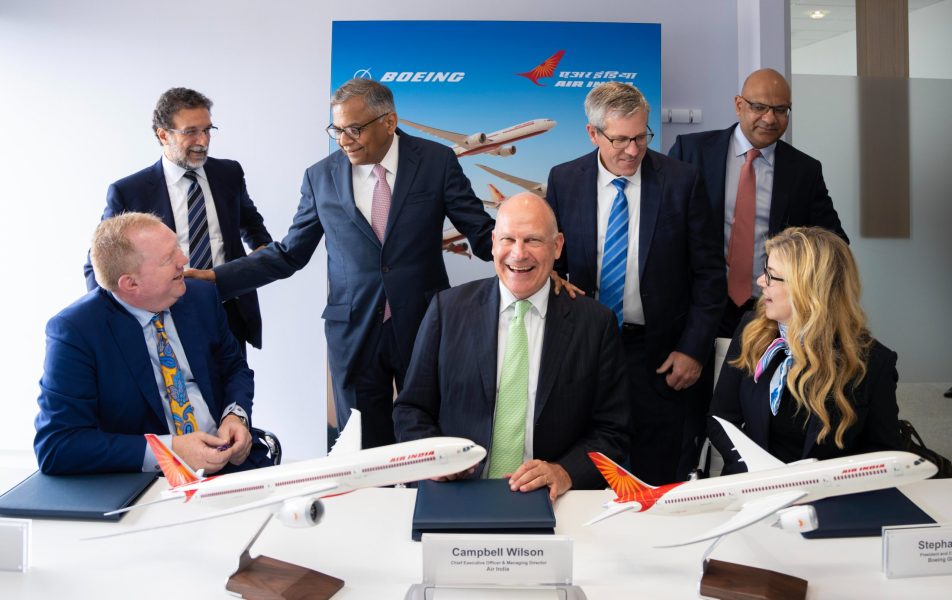
Why signing aircraft purchase deals abroad makes sense for Indian airlines

During a conference call on the afternoon of February 14 this year, Prime Minister Narendra Modi and French President Emmanuel Macron were joined by representatives from Air India (AI), who announced that the airline had made a firm commitment to purchase 250 Airbus aircraft.
Later the same evening, US President Joe Biden announced that AI had also placed a firm order for 220 Boeing aircraft. These two mega announcements completed the AI order for 470 aircraft from both Airbus and Boeing.
But it was almost four months later at the Paris Air Show that the airline signed the purchase agreement for the mega fleet order. Incidentally, IndiGo also announced its largest order of 500 Airbus A 320s, a day before AI at the Paris Air Show.
Why was there a delay in AI signing the purchase agreement when the deal was announced in February? And why was the final signing done in France and not in India?
Flight Insight: IndiGo’s growing market share raises concerns of monopoly in Indian aviation
This delay led many to wonder if it had something to with Indian laws which makes aircraft, engine manufacturers and other original equipment manufacturers (OEMs), have greater faith in foreign laws than in Indian law in case of disputes.
Provisional agreement
However, various lawyers and analysts say it would be wrong to think that aircraft, engine manufacturers or other foreign companies do not have faith in Indian law. Vikrant Pachnanda, Partner, Fox and Mandal and an aviation attorney, explains that globally most airlines first announce a provisional agreement for purchase of aircraft and engines. Fox and Mandal is one of India’s oldest and premier law firms that was established 125 years ago.
“A provisional agreement is announced as happened in the case of Air India in February this year. This provisional agreement is basically a commercial decision whereby AI agreed to purchase 470 aircraft from both Boeing and Airbus at a particular price post negotiations between the parties. Subsequently the final purchase agreement was firmed up by both sides and involved lawyers as well who looked at everything from a legal perspective including which law will come into play in case of dispute,” Pachnanda says. He adds that normally English law is the preferred law for aircraft purchase agreements due to the English jurisdiction’s recognised body of commercial law and established precedents in large financial transactions.
“It has nothing to do with Indian law or any other law. English law has been a preferred choice of law for decades as far as aircraft purchase agreements are concerned,” Pachnanda emphasises. Another person who declined to be quoted added that English courts have in the past dealt with aviation related matters swiftly and without unnecessary delays. “Given aircraft deteriorate in value quickly if it is not maintained properly, swift adjudication in these matters is key,” he adds.
Flight Insight | Paris Airshow: Indian carriers likely to shop big, but that’s the easy part
The former Chief Financial Officer of an Indian airline agrees that the most common practice is to follow English law for large contracts. “There have been cases where Washington law has also been applied especially if the contract is with Boeing or a US company,” he says.
He adds that another reason why companies prefer to sign deals abroad is because of the stamp duty that will have to be paid on the contract if it is signed in India.
Cape Town Convention
Analysts and lawyers, however, concede that there are flaws in Indian laws as India is yet to fully implement the Cape Town Convention. The Convention is a repository of all aircraft globally. Airlines from countries which are signatory to the Convention find it easier to negotiate aircraft deals at prices which are lower, as being a signatory to the Convention gives a certain amount of assurance to the aircraft and engine manufacturers that they will be able to take back their asset in case an airline fails or if there is a dispute over payments.
Another person involved in such deals adds that this is different from a lease agreement where heavy stamp duties apply, which is why leases are signed overseas and no copies imported. In the case of purchase agreements, there is no ownership until the title of transfer, which happens only at delivery.
Globally, airlines prefer to go in for sale and lease back of the aircraft that they order. IndiGo primarily depends on this model, while AI might decide to buy some of the larger aircraft that form part of the 470 aircraft order.
Flight Insight: Indian aviation is bleeding; it’s time to roll out Open Skies Policy 2.0
Koushik Jagathalaprathaban, Partner, aviation advisory firm, AT-TV, puts things in perspective when he says that most OEMs also prefer announcing large orders at airshows. “Paris and Farnborough (airshows) have historically been the anchor airshows. Though Singapore and Dubai (air shows) are putting up a strong challenge,” he says.
(The writer is a senior aviation journalist based in New Delhi.)

